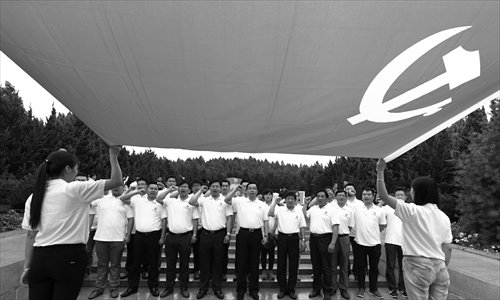HOME >> CHINA
Communist confrontation
By Jiang Jie Source:Global Times Published: 2015-9-28 20:58:01
Tycoon and Party organization argue about ideology online

Employees from Shanghai Civil Engineering Co., under the China Railway Engineering Corporation visit the cemetery of Xi Zhongxun, father of President Xi Jinping in Fuping county, Shaanxi Province on June 27. Photo: IC
A recent online debate over communism between a famous real estate developer and the Central Committee of the Communist Youth League of China (CYLC) has rekindled the nation's discussion on ideology.
Analysts said that the debate between two groups of Party members will only create more problems.
The debate started when Wang Xiangming, a professor at the School of Marxism Studies at Renmin University of China, wrote an opinion article in China Youth Daily on September 21. It dismisses public speculation about whether the current leadership would over-emphasize ideology, after President Xi Jinping said earlier in September that the country is still working toward communism.
On the same day, the CYLC kicked off an online discussion on Sina Weibo hash-tagged "we are the successors of communism" - a well-known lyric from a song popularized by the Young Pioneers, a communist youth organization. The CYLC's posts called for people to uphold communism, which they said is "the greatest ideal."
The topic became a major topic of construction online when real estate icon Ren Zhiqiang reposted a CYLC Weibo post, which contained a link to Wang's article, and complained that he had been "fooled" by the "successors of communism" slogan.
This bold comment quickly caught wide attention. Ren then explained that he still hopes that communism will one day be realized, but argued that it is "ridiculous" to ask CYLC members to be "communist successors" before communism has been achieved.
"Karl Marx told us that communism cannot be realized in one country. It has to be a consensus of universal values that hold no antagonism. Such a premise is so far non-existent. History has also proven that communism cannot be reached through violent revolution or a public-owned or planned economy. Nor will it become real without democracy and rule of law," said Ren in his post, which has been "liked" by netizens over 23,000 times as of press time.
While many voiced their support, criticism also poured in as netizens wondered whether Ren, a Communist Party member and a member of the Beijing Committee of the Chinese People's Political Consultative Conference, had betrayed his pledge of loyalty to the Party.
Two days after Ren wrote his post, the CYLC responded with comments from Jing Lin, a CYLC official, saying that communism is a "noble goal" which can only be achieved with the efforts of successive generations. Jing added that the exchange of posts was a "serious and calm" discussion with Ren, who "opposes communism in such an open, obvious and serious way."
Ren wrote on his blog on the same day that the CYLC should stop lying to its members. "Chinese people need no empty words on communism, rather ways to make a leap forward from the primary stage of socialism. We need no more great ideals but down-to-earth measures, or the current achievements may be lost."
The back-and-forth between the two sides was closely watched by the public and each Weibo post was reposted hundreds of thousands of times. While some experts have agreed with Ren's point about slogans not being able to solve problems, they have also criticized the debate as not being useful.
Shen Yang, a Guangzhou-based political science scholar, said that the CYLC should spend more time explaining how the cause of communism is related to the nation's development at present rather than on spreading old slogans.
"The so-called debate is meaningless both in academia and in governance. They will only introduce more problems if they try to solve a problem through such debate," he noted.
On the other hand, Ren's opinions are echoed among many people born in the 1950s who had suffered a lot during the Cultural Revolution (1966-76), according to Shen. "The word 'communism' may bring back bad memories of that time. This is unfortunately a historical fact whose impact the Communist Party of China (CPC) cannot escape."
Shen pointed out that similar debates can be seen every now and then in the past 30 years, as a reflection of the intra-Party debate between groups of Party members who emphasize reform and ideology respectively. "As a party of pragmatism, the CPC has tried to balance and absorb both groups' wisdom in governance."
Posted in: Politics